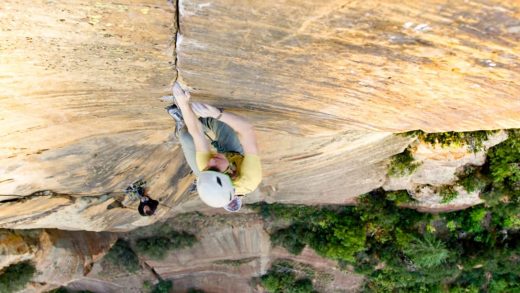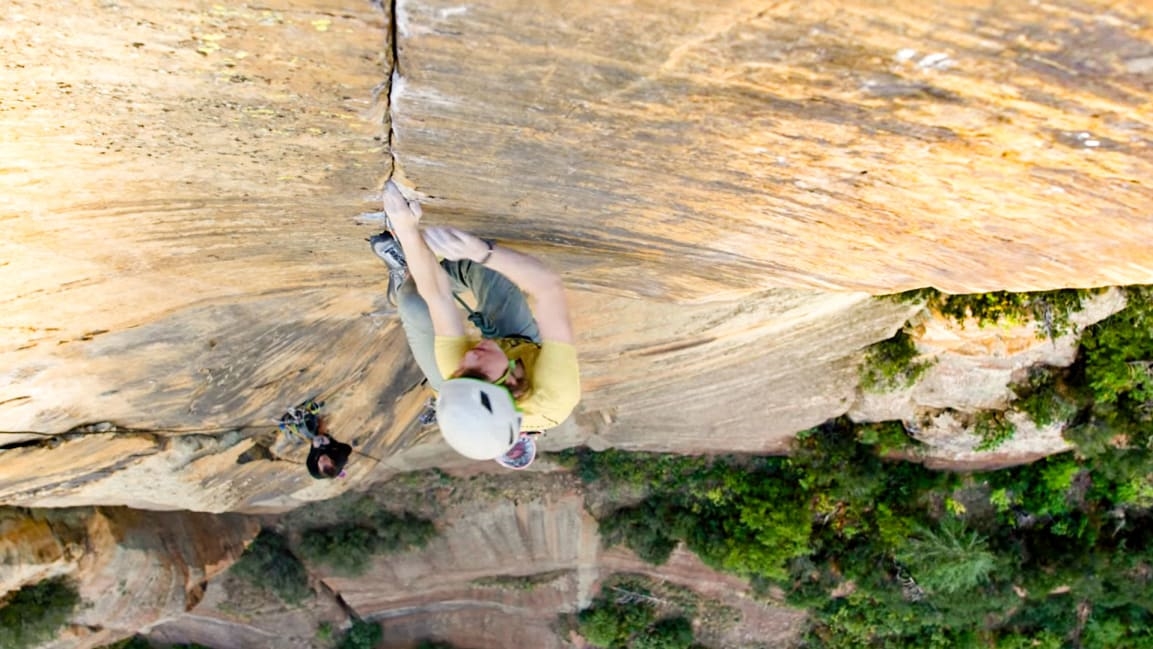Patagonia’s new film ‘They/Them’ celebrates a trans climber’s inspiring journey
To the untrained eye, the Sedona rock-climbing route called “East Coast Fist Bump” looks like a sheer cliff drop of craggy rock. Back in February, Lor Sabourin was celebrated on Rock and Ice, a popular climbing site, for becoming the first non-binary climber to scale the route in traditional climbing gear. Some of the comments on the post inevitably veered into debating the legitimacy of both their achievement and the very idea of non-binary and gender identification.
For Sabourin, it was an emotional experience that embodied the daily challenges of many in the trans community, and illustrated what it means to be a highly visible member of that community. Now, the 28-year-old is taking that visibility further in a new film with Patagonia called They/Them, which debuts online today.
Patagonia has long used film and the excitement and allure of adventure sports to address broader issues, from fish farming (Artifishal) and regenerative agriculture (Unbroken Ground) to wilderness protection (Jumbo Wild) and renewable energy (We The Power). Here, it takes that approach to gender identity and inclusion: showing how climbing and the climbing community is a microcosm of the adversity faced by a marginalized group, and how that group is treated in the wider world.
The film follows Sabourin as they plan and attempt a particularly challenging climb in the sandstones of northern Arizona, while telling the story of how they grew up and found comfort and community in climbing. Sabourin knows that a film from Patagonia will only extend the spotlight started by that Rock and Ice article, as well as the potential backlash. But they also know that this kind of visibility is a necessary way to change attitudes.
“When you look at the people in the trans community who are hurt or murdered, it tends to be Black trans people,” says Sabourin. “The fact that I am masculine of center and also white makes it so that when I experience violence, it’s more likely to be micro-aggressions than it is to be a threat to my life. I’ve experienced physical violence, but I’m much less likely to experience it from this film than someone else. So if I can start the conversation, and use some of my privileges to get the story told to change some hearts and minds and ultimately create more protection in the climbing community, that opens space for other people in some of these more marginalized identities to tell their stories.”
In teaming with Patagonia, Sabourin says they’ve seen firsthand how the company practices what it preaches—for instance, by training hundreds of people on gender inclusivity in the workplace. It’s also made significant strides in creating safe spaces in retail stores and offices for gender inclusivity. “What I’ve really noticed about Patagonia is that they’re willing to look at an issue, and rather than get defensive about what they’re already doing, they’re looking for ways that they can do better,” says Sabourin. “That inspires me to approach my own beliefs and limitations, and makes me feel really safe to give feedback and explore ways in which we can all do better.”
As specific as Sabourin’s story is, they see the message of the film as a broad one. “At face value it could be seen as just a story about the experience of a trans person,” says Sabourin. “But really, what we talk about in the film are things that are universal human experiences: the desire to belong, the way we learn how to deal with our relationships, going through tough times, taking care of your mental health. These are not unique to the trans experience. I hope people who are watching it don’t just see it as a statement on how to be more supportive of trans people, but maybe to be more compassionate toward everyone in their lives, and see our stories as a way to remember that everyone is human, and how to support one another in more affirming ways.”
Fast Company , Read Full Story
(24)



